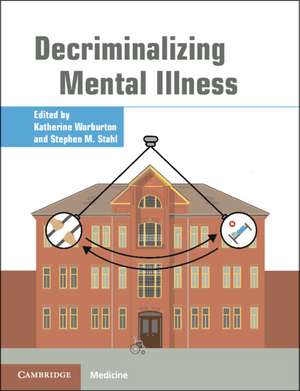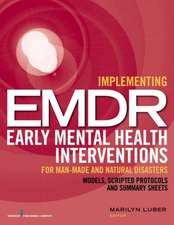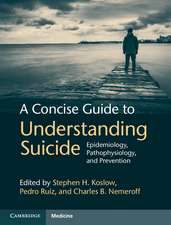Decriminalizing Mental Illness
Editat de Katherine Warburton, Stephen M. Stahlen Limba Engleză Paperback – 6 ian 2021
Preț: 404.95 lei
Preț vechi: 426.27 lei
-5% Nou
Puncte Express: 607
Preț estimativ în valută:
77.49€ • 82.86$ • 64.61£
77.49€ • 82.86$ • 64.61£
Carte disponibilă
Livrare economică 27 martie-10 aprilie
Preluare comenzi: 021 569.72.76
Specificații
ISBN-13: 9781108826952
ISBN-10: 1108826954
Pagini: 406
Dimensiuni: 190 x 246 x 19 mm
Greutate: 0.91 kg
Ediția:Nouă
Editura: Cambridge University Press
Colecția Cambridge University Press
Locul publicării:Cambridge, United Kingdom
ISBN-10: 1108826954
Pagini: 406
Dimensiuni: 190 x 246 x 19 mm
Greutate: 0.91 kg
Ediția:Nouă
Editura: Cambridge University Press
Colecția Cambridge University Press
Locul publicării:Cambridge, United Kingdom
Cuprins
List of Contributors; Part I. Introduction/Description of the Problem: 1. Balancing the Pendulum: Rethinking the Role of Institutionalization in the Treatment of Serious Mental Illness; 2. Deinstitutionalization and Other Factors in the Criminalization of Persons with Serious Mental Illness and How it Is Being Addressed; 3. A Brief History of the Criminalization of Mental Illness; 4. A Social History of Psychotic Illness; 5. Forensic Patients in State Psychiatric Hospitals: 1999-2016; 6. A Survey of National Trends in Psychiatric Patients found Incompetent to Stand Trial: Reasons for the Re-Institutionalization of People with Serious Mental Illness in the United States; 7. Forensic Psychiatry and Mental Health in Australia: An Overview; 8. Community Forensic Psychiatric Services in England and Wales; 9. A Longitudinal Description of Incompetent to Stand Trial Admissions to a State Hospital; Part II. Solutions: 10. Jail Diversion: The Miami Model; 11. Jail Diversion: A Practical Primer; 12. Principles and Practices of Risk Assessment in Mental Health Jail Diversion Programs; 13. Decriminalization in Action: Lessons from the Los Angeles Model; 14. Economics of Decriminalizing Mental Illness: When Doing the Right Thing Ironically Costs Less; 15. Decriminalising Severe Mental Illness by Reducing Risk of Contact with the Criminal Justice System, Including for Forensic Patients; 16. The Cal-DSH Diversion Guidelines; 17. Decriminalizing Mental Illness: Specialized Policing Responses; 18. Dopamine Antagonist Antipsychotics in Diverted Forensic Populations; 19. Monitoring and Improving Antipsychotic Adherence in Outpatient Forensic Diversion Programs; 20. Pharmacological Treatment of Violence in Schizophrenia; 21. Neurocognition and Social Cognition Training as Treatments for Violence and Aggression in People with Severe Mental Illness; 22. Examining Violence Among Not Guilty by Reason of Insanity State Hospital Inpatients Across Multiple Timepoints: The Roles of Criminogenic Risk Factors and Psychiatric Symptoms; 23. Criminogenic Risk and Mental Health: A Complicated Relationship; 24. Implementation of a Specialized Treatment Program to Reduce Violence in a Forensic Population; 25. From Trauma-Blind to Trauma-Informed: Re-thinking Criminalization and the Role of Trauma in Persons with Serious Mental Illness Population; 26. The Indistinguishables: Determining Appropriate Environments for Justice Involved Individuals; 27. Breaking Down Long-Term Chronic Aggression within a Forensic Hospital System; 28. Tipping the Scales of Justice: The Role of Forensic Evaluations in the Criminalization of Mental Illness; 29. Competency to Stand Trial and Criminalization: An Overview of the Research; 30. Risk Factors for Recidivism in Individuals Receiving Community Sentences: A Systematic Review and Meta-Analysis; 31. Developing Policies for Adult Sexual Minorities with Mental Health Needs in Secured Settings (Review article); 32. An Overview of Jail-Based Competency Restoration; 33. Fixated Threat Assessment Centres: Preventing Harm and Facilitating Care in Public Figure Threat Cases and Those Thought to Be at Risk of Lone-Actor Grievance-Fuelled Violence; 34. Decriminalizing LGBTQ+: Reproducing and Resisting Mental Health Inequities; 35. Building a Therapeutic Relationship between Probation Officers and Probationers with Serious Mental Illnesses; 36. Length of Stay for Inpatient Incompetent to Stand Trial (IST) Patients: Importance of Clinical and Demographic Variables; 37. Severe Mentally Ill Patients: Our Global Migrants: Neuroethical Issues in Psychiatry and Pharmacology Today: A Brief Manifesto towards The World Symposium 2021; Index.
Recenzii
'This book is designed for practitioners and those training to enter the field and could be used as a textbook for courses on mental illness and the criminal justice system … Recommended.' W. R. Pruitt, Choice Connect
Descriere
An in-depth examination of the factors contributing to the criminalization of mental illness and strategies to combat them.















